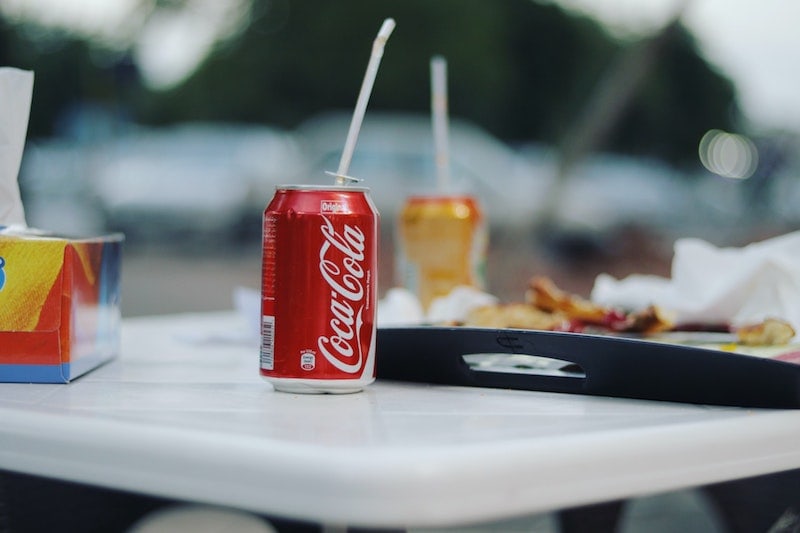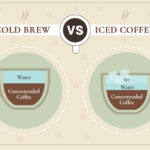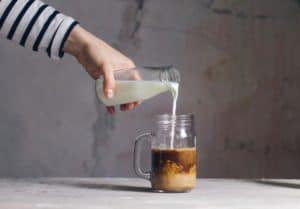
Coke is the most popular soda globally and is sold in more than 200 countries across the globe. It’s a sugary, carbonated drink, often referred to as the original energy drink, thanks to the original drink’s use of coca leaves and kola nuts. However, today’s drink has removed cocaine from its ingredients, and rumors suggest that the closely guarded secret ingredients no longer get their caffeine from the kola nut, either.
Despite that, there is still a reasonable amount of caffeine in Coke. For example, in a 12 oz can, you will find 34 mg of caffeine in standard Coke and 42 mg of caffeine in Diet Coke.
Unsurprisingly, energy drinks like Red Bull do contain substantially higher concentrations of caffeine, and so too does a standard coffee. Most soda manufacturers also develop caffeine-free versions of their drinks, including caffeine-free variants of Coca-Cola and Diet Coke.
Coca-Cola: The Original Energy Drink
Coca-Cola was once known as the original energy drink. Its traditional formula was created in 1886 by the pharmacist, John S. Pemberton, who created the drink as a cure-all tonic. The ingredients include coca leaves, which are the basis for cocaine, and kola nuts, where the drink would have initially gained its caffeine content.

Caffeine In Coke
The Coke recipe is a highly-guarded secret and, while it is clear that it no longer includes coca leaves, it is less clear whether the drink still gets its caffeine from kola nuts or whether it uses a synthesized, artificial form.
Whatever the source, though, the levels of caffeine in Coke are well documented. In a 12 oz can of Coke, there is 34 mg of caffeine, while in the same amount of Diet Coke, there is 42 mg of caffeine.
This means that the Diet variant has higher caffeination levels than the standard soda, surprising to many pop drinkers. The manufacturers have said that they use caffeine to add flavor to their drinks and that it offers a slightly bitter taste. Therefore, Diet Coke has more caffeine because it enhances the flavor and not because of its stimulating effects.
Coke has come under fire in the past, partially because of its high sugar content and because it is considered to have high caffeine content, especially for a soft drink targeted at children.
Caffeine-free versions of Coke and Diet Coke are available, both of which contain no caffeine. Coke Zero, another popular drink in the same range, contains zero sugar but approximately 34mg of caffeine per 12 oz can.
How Does Coke Compare to Other Drinks?
How Much Caffeine Is In Coke Vs Coffee?

So, a can of Coke contains 34 mg of caffeine, but how does this compare to the world’s favorite caffeinated hot drink, coffee?
Different coffee drinks and different beans have different caffeine levels. For example, typical coffee would contain approximately 150 mg of caffeine in 12 oz of beverage, but it is rare to drink such a large cup of coffee, and some coffee-based drinks have lower or higher levels.
Instant coffee contains approximately 120 mg of caffeine per 12 oz drink, while even decaffeinated coffee can contain around 5 mg of caffeine.
How Much Caffeine Is In Coke Vs Tea?

Tea might be considered the less caffeinated alternative to coffee, but it probably isn’t as low caffeine as many people think. As with coffee and Coke, the caffeine level varies by the style of tea and portion size.
A 12 oz cup of black tea contains about 75mg of caffeine, although green tea has a lower concentration, and 12 oz of this increasingly popular beverage would contain, on average, 40mg.
What Sodas Have The Most Caffeine?
Coke and Pepsi have been heavily criticized for the levels of caffeine and sugar levels of their drinks. In addition, critics point to the fact that these drinks are popular with children and young adults: groups discouraged from drinking high caffeine energy drinks and beverages. Although Diet Coke ranks highly in a list of caffeinated soft drinks, Coke doesn’t fare as badly.
Mountain Dew contains 54 mg of caffeine per 12 oz, while Dr. Pepper has 41 mg.

What Soda Has The Least Caffeine?
Caffeine does not naturally occur in fruit drinks or during the carbonation process, and manufacturers must intentionally add caffeine to a drink for it to exist. As such, there are plenty of caffeine-free drink options available. For example, Fanta, ginger ale, and most root beers do not contain any. Similarly, drinks like caffeine-free Coke and caffeine-free Pepsi contain no caffeine.
How Much Caffeine In Coke?
Although Coke is a soda, it does contain caffeine. It has about a quarter as much as a similarly sized coffee drink would contain, excluding pure espresso but including espresso-based beverages. Of course, Coke isn’t the only drink that contains caffeine. Here is a quick recap of some popular drinks and the amount of caffeine in a standard 12oz portion.
| Drink | Caffeine (per 12oz drink) |
| Caffeine Free Coke | 0 mg |
| Decaffeinated Coffee | 5 mg |
| Coke | 34 mg |
| Green Tea | 40 mg |
| Diet Coke | 42 mg |
| Mountain Dew | 54 mg |
| Black Tea | 75 mg |
| Energy Drinks | 100 mg |
| Instant Coffee | 120 mg |
| Espresso Coffee Drinks | 150 mg |
See also:
- Is There Caffeine in Sprite?
- How Much Caffeine is in Arizona Green Tea?
- How Much Caffeine in Mountain Dew Kickstart?
Featured Image Credit: Mahbod Akhzami, Unsplash















